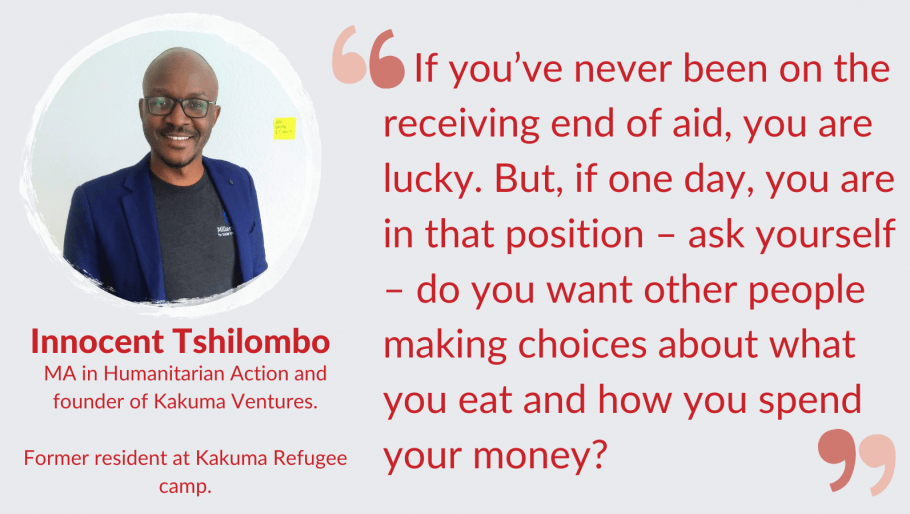Being on the receiving end: Why vouchers lack dignity and are bad value

About the author

Innocent Tshilombo left DRC 10 years ago and has been living in Kakuma refugee camp for most of the time since then. He is founder of Kakuma Ventures in the camp and in 2020/2021 he pursued his Master’s in humanitarian action at the Geneva Centre of Humanitarian Studies. These studies included modules on cash and voucher assistance, which inspired him to write this blog – reflecting on his experience of receiving assistance.
My Experience with Cash Assistance
I came to Kenya in 2009 from DRC and Kakuma refugee camp has been my home for much of the last 10 years. Kakuma is a camp in the north-western Kenya where WFP distributes monthly e-vouchers and in-kind assistance through three food distribution centres managed by their partner organizations to serve a population of 157,539 people.
I present the perspective of a recipient who has experienced collecting in-kind aid and who has seen e-vouchers introduced as part of the assistance provided. I believe that cash assistance offers value for money and offers more flexibility by offering options to beneficiaries and preserving their dignity compared to in-kind assistance.
However, the objectives of humanitarian organizations providing sector-specific cash and voucher assistance limit the benefits of cash assistance to beneficiaries.
Over time there has been a lot of improvement, but collecting in-kind aid in the Kakuma refugee camp still takes 2-4 hours and is a struggle discouraging some beneficiaries from collecting their aid in order to avoid the nightmare of dealing with brutality from security personnel, some of whom prioritize their relatives and friends to be served first. Sometimes people can be so frustrated with the collection process that they skip the distribution and miss out on a month’s in-kind food basket.
A few years ago, the in-kind assistance was partially cut and replaced with a mobile food e-voucher locally known as “Bamba Chakula” (‘get your food’ in Swahili). Collecting the in-kind assistance was a pre-condition to qualify for receiving Bamba Chakula. Consequently, missing the collection of in-kind assistance led to the disqualification of receiving the Bamba Chakula. This pre-condition made those who did not feel safe at collection points or who failed to collect their in-kind assistance for any reason even more vulnerable.
WFP and their partners were the only ones that distributed e-vouchers targeting all households in the camp. The e-voucher was designed to meet specific objectives aimed at enabling people to purchase fresh foods that were not available in-kind at the food distribution centers like milk, meat, vegetables, and fruits.
The restrictions and pre-conditions attached to Bamba Chakula led to less flexibility and choice, poor value for money, and lowered the dignity of the beneficiary.
The restrictions and conditions for receiving Bamba Chakula were further tightened by the managers of the few stores pre-selected by WFP to participate in the e-voucher program. In some cases, restrictions on what to buy reduced the value of the e-voucher. In a situation when a beneficiary would need to purchase an item that was not covered by Bamba Chakula, the trader would devalue the e-voucher to a random value as low as 60% of its actual cash value. On the other hand, with only a few stores participating in the e-voucher program, the economic benefits to the local businesses that participated in the e-voucher program created a new form of market inequality and unfair competitive advantage between traders – with benefits to those who participated in the e-voucher program compared to those who did not. What’s more, Bamba Chakula was conditioned for use within less than 7 days, after which the value was discharged from the mobile account with no lasting benefit to the end-user beyond the e-voucher period.
There are obvious inequities that exist among the refugee population in the Kakuma refugee camps. Aid should not deepen these inequalities.
The introduction of restricted and conditional e-voucher assistance is perceived as another layer of constraint imposed on refugees. This comes on top of the existing constraints imposed by the refugee policy in Kenya which limits, for example, the income streams a refugee can access and sets a limit to earnings that a refugee can receive if they are employed by an organization in the camp.
The situation in Kakuma reflects how humanitarian project design is influenced by many factors. Implementation and monitoring are influenced by inherited biases, habitual perceptions about the responsibility of a beneficiary over the choices they have to make in their own lives, and the lack of evidence in the humanitarian sector. Such factors create an obvious obstacle to roll out cash assistance and fail to reap the benefits that cash as a form of assistance offers in a response to humanitarian needs.
Cash assistance is intended for beneficiaries and they have the primary responsibility to decide what is best for them. Sector-specific CVA interventions, such as the one offered by WFP in Kakuma, with a restricted focus on food, should also embrace multi-purpose cash assistance which can be used on food and other things according to need.
Just because e-vouchers are restricted to the purchase of food does not mean a person will choose to spend their money on food all the time – as they have other needs to consider – but it does mean they are penalized for doing so as value is lost in the process.
Restricted and conditional cash and voucher aid reproduces a new form of wasted resource that is akin to the distribution of unwanted products that are sometimes included in the basket of in-kind aid. Sector strategies must be adapted to promote a liberalized choice of options, flexibility, and dignity for beneficiaries, whether in education, food security, or health, while taking into account protection needs.
If you’ve never been on the receiving end of aid, you are lucky. But, if one day, you are in that position – ask yourself – do you want other people making choices about what you eat and how you spend your money?
Big thanks to Innocent for this clear and engaging testimony. Please refer to the CALP Network’s Programme Quality Toolbox for support on the development, maintenance and review of quality Cash and Voucher Assistance.


